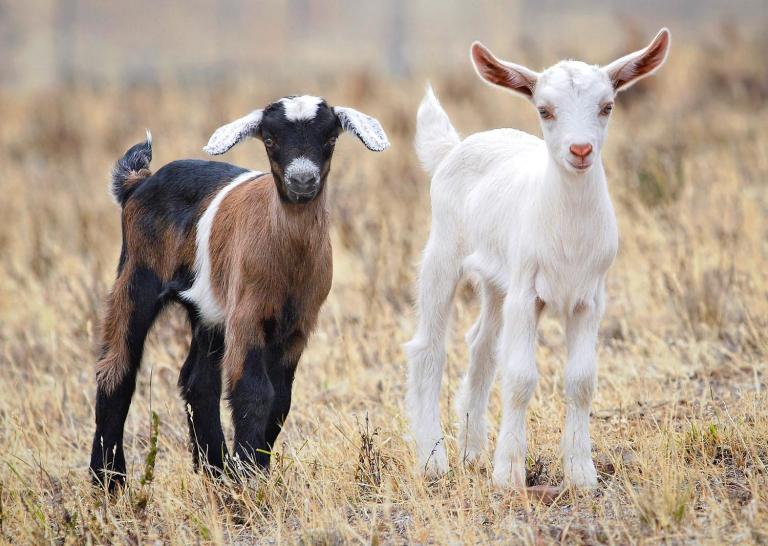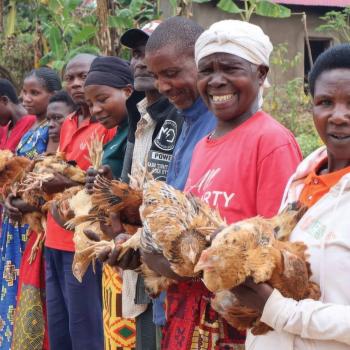Anyone? Anyone? Just the guy who grew up on the farm? That’s not altogether surprising, especially as the American society has become less agrarian and more urbanized. Because the vast majority of us have never owned a goat, we are likely to have a less-than-accurate understanding of a goat’s potential value to its owners, which could make one wonder why so many faith-based agencies (FBO) suggest goats among the many offerings of their Christmas catalogs.
Here are a few reasons why Gospel for Asia (GFA) and other FBOs offer the opportunity to give goats to families in the impoverished, remote villages throughout Asia.
5 Reasons Why Goats Can Be a Blessing for a Family in Asia
1. Goats produce a generous amount of healthy milk.
The average nanny goat produces about 90 quarts of fresh milk per month. That’s much more than the average family will drink, so goat’s milk can become a good source of income to help families prosper.
Goat’s milk is much easier for humans to digest than cow’s milk. Studies have proven that people who drink goat’s milk benefit from its unique composition. Babies respond especially well to goat’s milk.
2. Goats are prolific breeders.
The gestation period for goats is six months. A nanny will typically birth one kid in her first year, but usually twins most years after that. It can be a relatively short period of time before the gift of two goats becomes a herd of goats. (Heard of goats? Of course, you have. That’s what we’re talking about.)
Do the math.
More goats = more milk = more revenue because the recipient family’s usage doesn’t increase.
At some point, the goat recipients (now goatherders) may wish to expand their enterprise by selling goats to other families who may then prosper as well.
3. Goats don’t graze. They browse.
Contrary to popular belief, goats don’t eat tin cans and rubbish. They will, however, eat food scraps. But, to our point: Goats do eat a certain amount of grass, depending upon their personal preferences. In animal husbandry terms, goats are browsers.
Browsing is a type of herbivory in which an herbivore (or, more narrowly defined, a folivore) feeds on leaves, soft shoots, or fruits of high-growing, generally woody, plants such as shrubs. This is contrasted with grazing, usually associated with animals feeding on grass or other low vegetation. Alternatively, grazers are animals eating mainly grass, and browsers are animals eating mainly non-grasses.
Goats are such great browsers, they are a virtual weed-eater. They are not messy. They are the cleanup crew.
4. Goats are great pack animals.
Goats can typically carry up to 30 percent of their own body weight, and they don’t mind doing so especially if trained to do so. Since they are relatively easy to teach and adapt well to a harness and leash, a goat will gladly make your load lighter.
5. Goats make great companions.
They are not smelly or stubborn. A well-trained goat can be just as loyal, sweet and fun as a dog. They are very friendly, social animals, and caring for them is relatively easy.
There you have it. By now, you are probably thinking about buying a goat or two. If you are, may we suggest that you buy them for someone for whom they will become the proverbial light at the end of the long tunnel of poverty? Click here today to access Gospel for Asia’s Christmas Gift Catalog to learn how you can give a pair of goats to a family in Asia.
Oops. We forgot that there is at least one more reason to buy goats: They’re cute.
Sources:
- Buffalo Creek Farm and Creamery, Why Raise Goats?
- The Spruce, The Benefits of Raising Goats
- Idea Hacks, 23 Reasons Why You Should Start Raising Your Own Goats
- Resilient Life, Should You Raise Goats?
- Dummies.com, The Benefits of Raising Goats
- Animal Behavior Online, Browsing versus Grazing
- Wikipedia, Browsing (herbivory)
Image Source:
- fir0002 [GFDL or CC-BY-SA-3.0], from Wikimedia Commons
Click here, to read more blogs on Patheos from Gospel for Asia.
Go here to know more about Gospel for Asia: GFA.org | Facebook | Youtube | Twitter | GFA Reports














